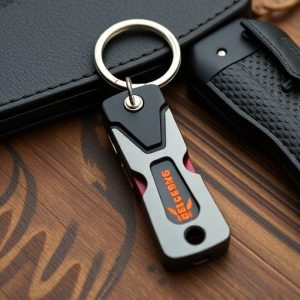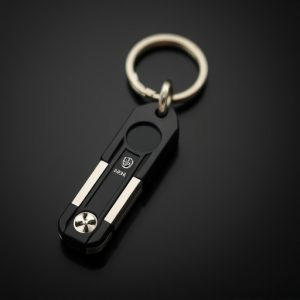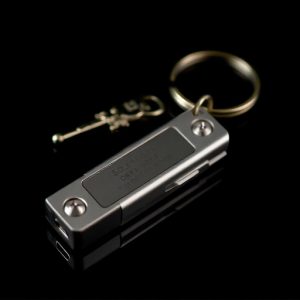Compact Keychain Weapon Accessories: Global Legal Check & Safety Standards
The definition and regulation of compact keychain weapon accessories differ significantly across jur…….
The definition and regulation of compact keychain weapon accessories differ significantly across jurisdictions, affecting their production, sale, and possession. These variations are based on size, functionality, and perceived danger, leading to varied rules regarding licensing, age limits, and manufacturing materials. Staying informed about these legal nuances is essential for manufacturers and users to ensure compliance and avoid legal issues, especially in today's global market where what is permissible in one region may be banned elsewhere. Understanding local regulations, including permit requirements, usage restrictions, and registration demands, is crucial before carrying such accessories to promote safe and responsible ownership. For manufacturers, adhering to safety standards and staying updated on regional firearms legislation enhances product quality, marketability, and user confidence.
In an era where personal safety is paramount, compact keychain weapon accessories have gained popularity as a convenient self-defense option. However, navigating legal requirements for these devices can be complex and varies globally. This article serves as your comprehensive guide to understanding the legal definitions, regional restrictions, permits needed, safety standards, and common misconceptions surrounding compact keychain weapon accessories. By delving into these aspects, you’ll ensure compliance and make informed decisions regarding your safety.
- Understanding Legal Definitions: Keychain Weapons and Their Regulations
- Regional Laws and Restrictions: A Global Perspective on Compact Keychain Weapon Accessories
- Permits, Licenses, and Registration: What You Need to Know Before Carrying
- Safety Standards and Testing: Ensuring Your Device Meets Legal Requirements
- Common Loopholes and Misconceptions: Navigating the Legality of Keychain Self-Defense Devices
Understanding Legal Definitions: Keychain Weapons and Their Regulations
In many jurisdictions, the legal definition of a “keychain weapon” or “compact keychain accessory” varies, shaping the regulations that govern their production, sale, and possession. These definitions often include criteria based on size, functionality, and potential as a weapon. Understanding these legal parameters is paramount for anyone considering acquiring such devices, as they can significantly impact accessibility and restrictions.
Regulations may classify compact keychain accessories into different categories, each with its own set of rules. For instance, some countries differentiate between self-defense tools that are designed to be discrete and those deemed more offensive or dangerous. This classification often dictates licensing requirements for possession, age restrictions, and even the types of materials used in manufacturing. Staying informed about these legal nuances is essential to ensure compliance and avoid potential legal repercussions.
Regional Laws and Restrictions: A Global Perspective on Compact Keychain Weapon Accessories
In today’s globalized world, the legal landscape surrounding compact keychain weapon accessories varies drastically from region to region. What may be legally permissible in one country could be strictly prohibited in another, making it crucial for manufacturers and users alike to stay informed about local regulations. This is particularly important given the increasing popularity of compact keychain weapons as personal defense tools.
For instance, many countries have strict laws regulating the possession and use of any kind of weapon, including small self-defense devices. Some regions even mandate specific safety features and age restrictions for such accessories. Others may allow them only under certain circumstances, such as in cases of emergency or for professionals like security personnel. Understanding these regional laws is essential to ensure compliance and promote responsible ownership of compact keychain weapon accessories globally.
Permits, Licenses, and Registration: What You Need to Know Before Carrying
Before carrying a compact keychain weapon accessory, it’s crucial to understand the legal landscape surrounding permits, licenses, and registration. Each jurisdiction has its own set of rules that govern the possession and use of self-defense tools like these miniature weapons. In many places, you may need to obtain a permit or license to legally carry such accessories, which often come with specific restrictions on where and when they can be used. Failure to comply with these requirements could result in legal consequences, including fines or even criminal charges.
Researching local laws is essential, as regulations vary widely. Some areas might require registration of your compact keychain weapon, demanding detailed information about the device’s make, model, and serial number. Additionally, there may be limitations on the types of accessories allowed, the amount of force they can exert, and the circumstances under which they can be employed for self-defense. Staying informed ensures you remain within legal boundaries, fostering a safe environment for both yourself and those around you.
Safety Standards and Testing: Ensuring Your Device Meets Legal Requirements
When developing a compact keychain weapon accessory, adhering to stringent safety standards is paramount. These standards are designed to protect users and ensure that such devices do not pose unnecessary risks. Testing is a critical aspect of this process, as it validates the effectiveness of safety features and mechanisms. Reputable testing facilities assess the product’s performance against various criteria, including impact resistance, sharp edge containment, and trigger sensitivity, among others. This rigorous evaluation guarantees that your keychain weapon accessory meets or exceeds legal requirements, enhancing its marketability and user safety.
Manufacturers must remain updated on applicable laws and regulations to avoid any legal pitfalls. Staying informed about regional disparities in firearms legislation is crucial, as some areas may have stricter guidelines regarding compact keychain weapons. Compliance with these standards not only ensures that your product can be legally sold but also instills confidence in potential buyers, who prioritize safety above all else when considering such innovative accessories.
Common Loopholes and Misconceptions: Navigating the Legality of Keychain Self-Defense Devices
In the realm of personal safety, compact keychain weapon accessories have emerged as a popular choice for individuals seeking convenient self-defense options. However, navigating the legality of such devices can be a complex task, shrouded by common loopholes and misconceptions. One prevalent misunderstanding is that because these tools are small and easily concealed, they operate outside the purview of existing laws. In reality, many regions have specific regulations regarding the carriage of weapons, including those designed for self-defense.
Moreover, while compact keychain weapons may be marketed as legal in certain areas, local ordinances can vary widely. Some jurisdictions allow such devices only under strict conditions, while others might entirely prohibit their possession. Individuals must also be aware of the difference between defensive tools and offensive weapons. Legality often hinges on factors like blade length, purpose, and potential use, which necessitates a thorough understanding of local laws.
When it comes to compact keychain weapon accessories, navigating legal requirements can be a complex task. Understanding the nuances of regional laws and ensuring your device meets safety standards is paramount. By staying informed about permits, licenses, and registration processes, you can legally carry a keychain self-defense device with confidence. Remember, staying within the boundaries of the law not only protects you but also fosters a safer environment for all.


